No matter how much you would want to be in a relationship with someone, there are always a few toxic types you should avoid. NO MATTER WHAT.
All of us want very different things from our relationships, and that’s okay. Some of us want partners that hold our hand on grand adventures, and some of us are looking for something more simple. Whatever you’re looking for, the way you see relationships as a whole will go a long way into defining your closest and most intimate partnerships.
The secret is knowing what you want, and cultivating the behaviors and traits that you would like to see in an ideal partner.
Our partners don’t rescue us and they don’t change us. We are the only people who can do that for ourselves. For this reason, it’s important to come into our partnerships open, well-adjusted, and whole — but that asks of us to face our emotional baggage and deal with the insecurities of our pasts.
If we want to build better relationships, we have to be better partners. That’s a transformation that can only come from within, however, and it can only come as a result of hard work and a commitment to change the way you see your partner and partnerships.
Forming Our Relationship Perceptions
The relationships that comprise our inner circles can make a huge difference when it comes to how we see ourselves and the world around us. Boyfriends, girlfriends, wives, husbands and partners offer us everything from emotional support to companionship, but it is possible to find ourselves giving little pieces away until we’re compromised past the point of return.
Avoiding this means building better relationship perceptions, and that’s a journey that begins within.
Our romantic relationships are complex and dynamic. We fall in love quickly and we can fall out of love just as quickly. When we love, we love deeply and that can often cause us to overlook critical red flags and warning signs that are best-faced head-on and in the moment.
Part of forming happy and lasting relationships is learning how to confront issues in those relationships as they happen, something that takes both time and understanding to carefully manage.
Though we often claim to be blindsided by our good love gone wrong, more often than not, there are a number of critical moments we ignore along the way. When our partners aren’t right for us, they have a funny way of showing us that truth, but it takes a dose of radical honesty to see these warnings for what they are.
To see these red flags for what they are and accept them, we have to start loving ourselves and setting boundaries both inside and out. Only when we learn how to love ourselves can we truly start loving others and receiving the love we deserve.
Related: Watch Out! 15 Types Of Toxic People That Ruin Relationships
The Toxic Relationship Types We Should Always Avoid
Not all relationships are created equal. While the right relationships can bring joy, tranquility, and even a sense of security into our lives, the wrong ones will unravel it in a number of ways.
From controlling relationships to outright abuse, these are the most toxic types of partnerships that are to be avoided at all costs.
1. One-sided control
One-sided relationships are toxic and leave little room for both parties to create transformative or meaningful experiences within their partnerships. When one partner takes all the control, they take away the independence and value of the other party.
Though we all want what’s best for our partners, we also have to respect their right to be who they are and express themselves in a way that is natural to them.
2. Passion-only
Ever had one of those relationships that light you on fire from the moment you meet? More often than not crazy, over-the-top, and passionate relationships burn hard and fast, but they can quickly lead to something toxic that burns down the rest of our life.
When we lean too hard into these types of relationships, we can find ourselves getting obsessed and quickly losing sight of our own strengths and individuality.
3. Endless bullying
Bullying in relationships isn’t natural, normal, or healthy. If your partner demeans, belittles, or otherwise pushes you around — you’re dealing with an abusive relationship, not a passionate one.
Though a bully might try to conceal their tactics beneath the guise of “care”, their main priority is keeping power, and they’ll use whatever tactics they need to achieve that end. Bullying is a favored tactic of abusers and narcissists alike.
4. Constant critics
Critical relationships aren’t comfortable, and they cause us to doubt ourselves and the way we see partnerships in general. A partner who constantly criticizes you is looking to demean your sense of self and increase your dependence on them and their opinions.
In order to build equitable and healthy relationships, we have to respect one another and offer only critiques that are necessary, wanted, kind, and warranted.
5. Drama queens
Dramatic relationships full of explosive arguments and constant blow-ups are a waste of time and distracting to the journey that we’re on. When we engage in relationships that are based all around the drama, we find ourselves battling tough emotional turmoil and constant fallout that can lead to a doubting of self and a doubting of our partners and relationships.
Drama doesn’t indicate true love — it indicates true dysfunction.
Want to know more about the toxic relationship types you should avoid? Check this video out below!
6. Instant obsession
Found yourself obsessed with someone after only knowing them for a short time? As tempting as it might be to consider this the real-deal, obsession is not love and should be avoided at all costs. Obsession is unhealthy and can force us to absorb into our relationship in a way that completely destroys our sense of purpose and self.
Without direction, we flounder whenever we’re separated from our partners and fail completely when faced with challenges on your own.
7. Enablers abound
The enabling relationship is an especially toxic one and one which can quickly turn into something far too codependent. Enablers encourage toxic behavior in their partners or go out of their way to ensure that they continue in patterns that keep them chained to the same place in life.
This might be due to their own insecurities, but it may also come from an insidious need to keep you controlled or otherwise weakened, vulnerable or reliant.
Related: 5 Ways To Avoid Toxic Relationships and Find Meaningful Ones
8. Punitive parenting
Punitive parenting occurs when one partner assumes the role of a “parent” within the relationship, monopolizing control, and dishing out punishment whenever their demands aren’t met.
The punitive partner isn’t concerned about the other person’s needs or even communicating — effectively — about their own needs. It’s only a matter of time until the resentment builds between both partners, leading to inevitable implosion.
9. Way too comfortable
Though we should feel secure in our relationships, we shouldn’t feel comfortable enough to give up on ourselves, our dreams, or our values. Relationships that feel like your favorite pair of slouchy sweatpants feel nice at first, but in retrospect, you realize that they were keeping you and preventing you from achieving better opportunities for yourself.
Comfort doesn’t equal happiness and vice versa. Being too comfortable can hold us back from real love.
10. Lies on lies on lies
Truth and authenticity are the cornerstones of any solid relationship, and without them — cracks are guaranteed to show. It’s impossible to work together and grow together as a healthy couple when one (or both) partner(s) are cloaking reality in their omissions or outright subterfuge.
When we lie to each other, we can’t identify problems and we shut down the channels of communication. Without trust, no one can move forward in good faith.
Why We Fall Into Toxic Relationship Traps
We learn our bonding behaviors when we’re young, and we continue to test and refine those patterns over time. The things we take on in childhood can follow us throughout our lives, but there are also a number of other places that we learn the toxic relationship patterns that keep us stuck, scared, and searching for some shred of happiness in eternal night.
1. Afraid to be alone
We live in a society that constantly tells us that our worth is a direct correlation to our relationship status. From adverts to movies— romantic relationships are made up to the backbone of happiness. Holding those beliefs can get you stuck in some unhappy situations. Clinging to relationships because you’re too scared to be alone is no justification.
It’s natural to want a partner, but it doesn’t define our happiness. Making your happiness dependent on another person will always result in failure. Learning how to make yourself happy, though? That lasts forever.
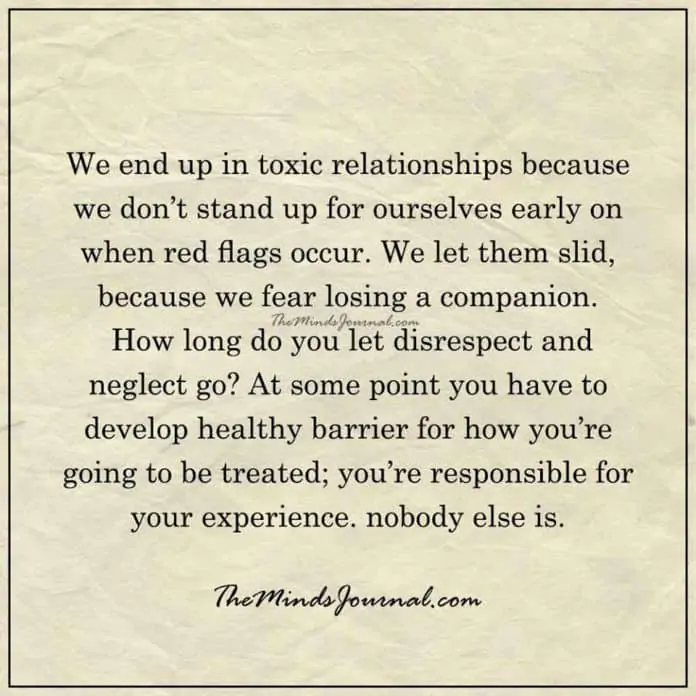
2. Low self-esteem
If you can’t respect yourself, it’s hard to find other people that will respect you either. Feeling good about ourselves is important; loving ourselves even more so. Poor self-esteem is one of the numbers of reasons people find themselves trapped in relationships that don’t suit them, but that self-esteem too, comes from a number of different places.
We might suffer from poor self-esteem because of past relationship experiences, or we might suffer from low self-esteem because of traumatic childhood experiences. Whatever your reason, it’s imperative that you identify it and correct it in order to thrive and break free of your poisonous passions.
3. Failure to identify patterns
As humans, we’re creatures of habit, but those habits can quickly become corrosive or self-defeating. The real problem, however, is that even when that’s the case — we often don’t walk away. Why? Because the familiar is more comfortable than the unfamiliar; a known bad is perceived to be safer than an unknown potential good.
Our patterns and routines hold an important role in our lives. However, just because we do something doesn’t mean it should be done; and it certainly doesn’t mean there isn’t a better way to do things in the future.
Related: 8 Types Of Toxic People You Should Leave Without Feeling Guilty
The Best Ways To Build Healthy Relationship Perceptions
You can avoid these toxic relationship pitfalls, by learning how to transform the way you see relationships and understand them. When we come into our partnerships as better partners, we release the need to control and be controlled, and we also lose our need to be defined by someone else.
Finding the perfect partner requires turning ourselves into that partner first, but that means digging deep.
1. Creating the perfect partner.
When it comes to our relationships, we spend a lot of time imagining the other person, but we rarely spend a great amount of time considering ourselves as partners within those same imaginings. If we want the “perfect” partner for us, we need to spend more time working on ourselves so that we can match the quality of partner we are trying to bring into our lives.
We attract what we put out into the world around us. Wanting the perfect partner is fine, but you have to be that person to bring that person into your life.
Before you go searching for meaning in another person, get to know yourself first. Be real about who you are in a partnership, and be honest about what you ideally want from a relationship. Commit to becoming the kind of partner that attracts faithful, honest, ambitious, and open people. Cultivate behaviors that allow you to fill your social circles with the good, the heartfelt, and the genuine.
Everything in this life is about energy and action. Drawing quality people (and thus quality relationships) into our lives requires having good energy and using that energy to inspire good and positive action. The more you put these good works into the world around you, the more they will grab the notice of other good people who are looking for partners with those qualities.
Good, honest, and hard-working people don’t just fall out of the sky. They’re around other good, honest and hard-working people. So be the partner you want to attract and start living in line with your true purpose.
2. Let go of your emotional baggage.
Our emotional baggage goes a long way in undermining our overall happiness and wellbeing, but it can really cause some serious snags when it comes to our relationships. We have to resolve our emotional baggage or risk finding ourselves in partnerships that are obsessive, short-lived, or otherwise fueled by the insecurities and shortcomings we focus on in ourselves.
Don’t jump into a relationship and expect it to ease the pain you are fleeing from in your past. If you’re still hung up on an ex, a new partner won’t erase that — they’ll just distract you from it for a little while. Likewise, emotional and mental disorders cannot be healed by “love”. They can be managed by us, however, and utilized in ways that make us better partners.
Let go of your emotional baggage before you join your life with someone else’s. Our partnerships require us to closely intertwine ourselves with people who are also dealing with their own adversities in our lives. It is unfair to saddle someone else with the expectation of our own emotional healing.
Don’t make your pain someone else’s burden. Heal yourself, and through that healing find emotional balance and better ways to connect.
3. Make peace with your past.
The past is an important place to start when looking to improve the way we see relationships. Our pasts contain the experiences that form our “baseline”, or the general level of understanding and acceptance we have about life.
If you come with a past filled with turbulent childhood memories or partnerships that hit the rocks more-often-than-not, then chances are you’ve come to see relationships as a battleground — rather than a mutual celebration of love, companionship, and commitment.
If you’re struggling with relationships that keep taking a tumble, or you find yourself struggling to trust your partners (no matter what), it might be a sign that you need to take a look at your past. Start at the beginning, and consider any little things that might have made you view relationships as challenges, rather than benefits.
Things like divorce, abuse, and even neglect from our parents can go a long way in shaping how we see not only ourselves, but our partners too.
Work backward, and find a way to untangle all the knots of heartbreak that tell you it’s not safe to trust, or not safe to love. If you’re someone with mile-high walls, dig down to the foundations of those walls and really breakdown the events that told you (and your subconscious) that relationships were dangerous, rather than safe.
Sometimes, the help of a mental health professional can go a long way in helping us to untangle these knots safely, but meditation and mindful journaling are great places to start too.
4. Understand your life is your responsibility.
Many of us mistakenly fall into relationships believing it will provide some sort of salvation from the things that plague us. The problem with this, however, is that it leads to inevitable let-down. That’s because there is no one who can save us but ourselves, and there is no one who can understand our problems as intimately as we can.
Our lives are our responsibility, and we have to accept that in order to attract quality partners.
Stop looking for some sort of fairy-tale champion to swoop in and rescue you. If you feel like life is overwhelming you or dragging you down, figure out what’s going wrong and then figure out your own way back to the shore.
No matter how much we might love someone — and no matter how much they might love us back — they cannot give us self-confidence, they cannot give us our ambition, and they cannot give us our abilities or our worth. Those are things that are completely determined by us, and us alone.
We are the masters of our own lives, and we are in control of how happy or sad we are within those lives. Partners do not make us happy, but they can contribute to the greater sense of joy we get from the overall experience of joy.
Related: Toxic Love: Signs To Identify If You Are In A Trauma Bond
5. Find happiness internally.
Along the lines of salvation, happiness is another factor in this life that we mistakenly contribute to having a partner alone. Relationships (on their own) cannot make us happy. If partnerships alone were all that was needed for joy, there wouldn’t be so many people in therapy.
Our romantic relationships are complex, and while they can certainly add to our overall experience, they cannot define us and they cannot fill that nagging hole inside.
If you are sad outside of your relationship, you’re going to be sad in your relationship. Think about your ideal partner. Are they happy? Sad? A complete misery to be around? If we want happy, well-adjusted partners: we have to be happy, well-adjusted partners. Putting the expectation of your happiness on someone else isn’t only unfair — it’s selfish too.
Find happiness internally and stop expecting the outer world to give it to you. We make the conscious choice each day to see this world how we want to see it. We can take in the misery around us and allow it to absorb us, or we can make the choice to be happy and find our way to building a life that is entirely our own (and fulfilling).
Before you go searching for a partner to give you that joy you’re looking for, try cultivating it for yourself.
6. Know (absolutely) what you want.
Perhaps the biggest mistake we make before bumbling into any relationship is not spending enough time considering who we are and what we want. More often than not, we find ourselves in toxic and poisonous relationships because we bumbled into them while stumbling through life.
Bumbling and stumbling happens when we don’t have a clear plan insight and we don’t have a plan. When you’re lost, you meet other lost people along the way. No one knowing where you are going, you find yourselves in places neither wanted to go.
Spend some time getting to know yourself, and spend some time getting familiar with what you really and truly want from your life — and any relationships that might exist within. Don’t shy away from your truths, and don’t allow the opinions and pressures of others to push you in any direction you don’t want to go.
Only when you are brutally honest with yourself can you attract the right partners who want the same thing. If you want flowers and picket fences and 2.5 kids — be honest about that, and don’t hide that in an attempt to make the wrong person fit.
Be who you are, and through that authenticity find those who truly align with you and your journey. Relationships that stand the test of time aren’t forged through personal similarities or sheer will alone. They’re managed by the unification of two people who are seeking the same things from their lives.
Putting it all together…
Finding the perfect partner is hard, and it’s not made any easier by trying to overcome the daily challenges of modern life. We want a relationship that adds stability and joy to what we’re trying to build, but that often takes a lot more internal work than we realize.
If we want the perfect partner, we have to be the perfect partner, and that takes getting real about what’s holding us back.
Attract the perfect partner by becoming the perfect partner. Work on yourself from the inside out and identify the things in yourself that you want from your future partners. Let go of your emotional baggage and make peace with your past, so you can come to the table with a clean slate and the ability to honestly and earnestly connect with someone without your insecurities and hangups getting in the way.
Stop expecting your partners to make you happy and create that happiness in yourself. After all, we have to be what we want to attract into our lives. Happy, confident people attract other happy, confident people. Spend some time falling in love with yourself and spend some time getting to know (inside and out) what you want from your partner and your relationships.
Check out E.B. Johnson’s Medium profile for more such articles.
Written By E.B. Johnson
Originally Appeared In Medium
Now that you know which toxic relationship types to avoid, make sure that you actually do so. Toxic people are just not worth your time. If you want that perfect partner for yourself, work on yourself first. Don’t compromise on your self-worth and happiness by getting involved in these toxic relationship types, which you should avoid like the plague.
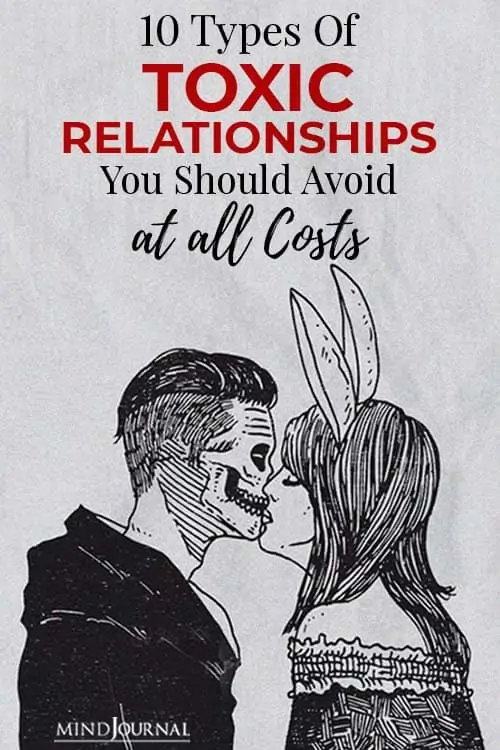
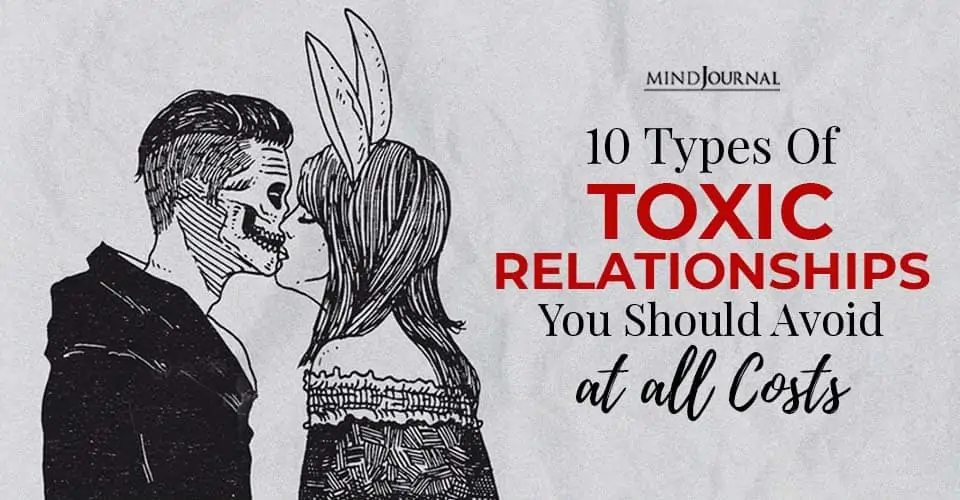

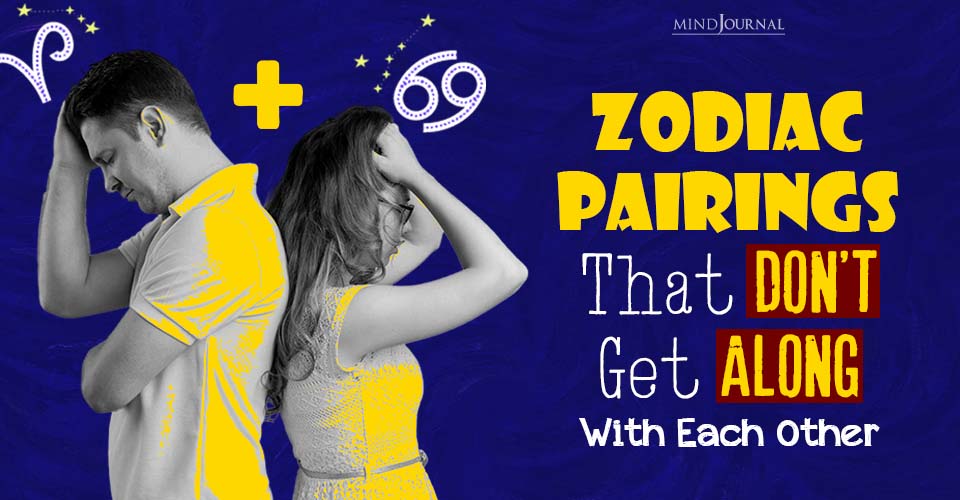




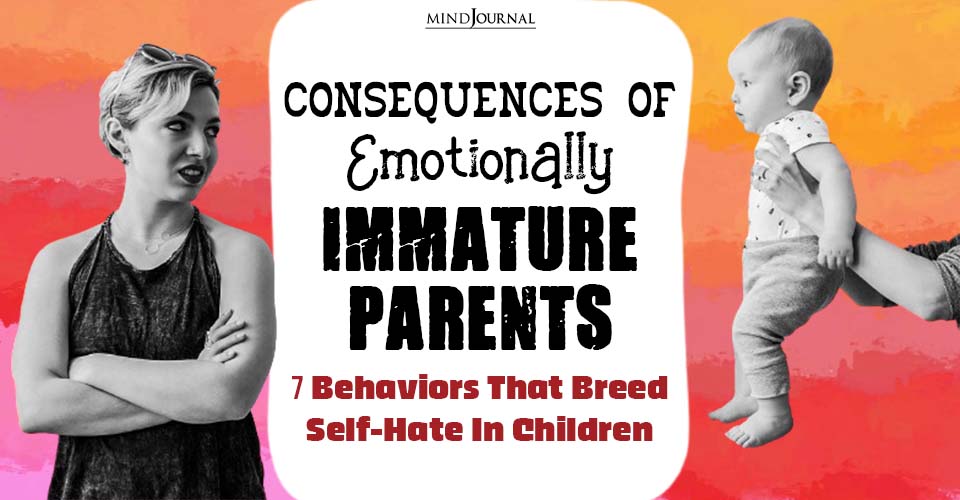
Leave a Reply
You must be logged in to post a comment.